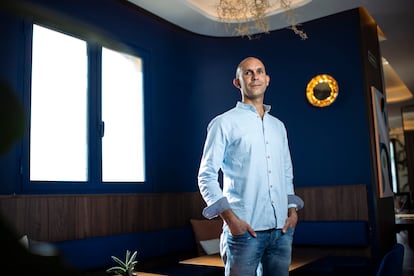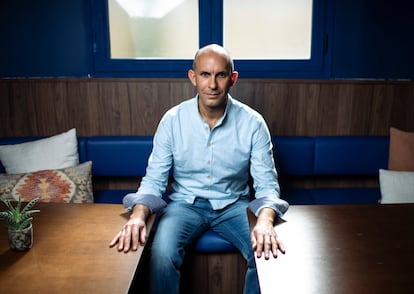Anil Seth, neuroscientist: ‘The notion of the soul may already have outlived its usefulness’
The researcher talks about the capacity to know the consciousness without the need for mysterious elements, and how that can help us live

Anil Seth speaks of consciousness as a controlled hallucination. The world we perceive, which seems so real to us, so hard to imagine in any other way, arises from a kind of negotiation between the way it reaches us through our senses and what we expect from it. From this reconstructed experience, which is also influenced by those of the people around us and the society in which we live, our consciousness and our self emerge. In his book Being You: A New Science of Consciousness, Seth, a cognitive neuroscientist from the University of Sussex in the U.K., guides us through his extensive experience as a student of consciousness in one of the most exciting scientific pursuits of the present, one that will continue to be so for decades to come. In an interview with EL PAÍS, he assures that — contrary to what some experts suggest — this challenge, which today seems impossible, will likely soon be within reach, as other peaks apparently inaccessible to human knowledge were before.
Question. In the 19th century, it was thought that life could not be explained in material terms, that a kind of spark of life was necessary, something mysterious and almost magical. Then came genes, DNA and other tools to try to understand it. Will it be possible to take that step with consciousness?
Answer. We have to wait and see. The notion of the soul, for instance, maybe that’s already outlived its usefulness. Concepts like free will are already succumbing and losing that sense of mystery. Free will is not this supernatural force that sweeps in and changes the course of events in the universe. It’s a particular kind of experience that organisms have related to actions that come from within. There’s nothing mysterious about that anymore, although not everybody agrees.
Little by little, this sense of mystery, that consciousness is really just this different thing that doesn’t fit into a picture of the universe made of atoms and quarks and neurons and bones and flesh may fade. For me, it’s already fading, but it’s not gone entirely because we don’t have the complete answer yet. Progress in science is often marked by changing the question we ask, not just finding answers to the questions we already had. People didn’t find the spark of life; they stopped looking for it because it was no longer the right question to ask.
Q. Science has been very good at answering questions about the material universe, but sometimes it seems that so much knowledge has not satisfied many existential needs. Can something different happen with the science of consciousness, can it help us in the search for meaning?
A. I think it may be not the job of science to do that, but it is part of the responsibility of scientists to understand this. Previous big mysteries in science also have had an existential angle. The discovery of the vastness of the universe is existentially challenging. And when we’re not at the center of it, but it’s an enormous universe of many untold billions of stars, you can either be scared by that or you can be empowered by that. And the same with life. Understanding that life is a natural phenomenon that continues with other animals can give us a sense of meaning that we’re connected to nature, or we can think of it as a threat because we’re no longer so special. To me, that’s what makes the difference. Human beings are special. I mean, we have culture, we have science, we have civilizations, but we are also part of nature. So understanding consciousness that way, it’s not something that is given by some supernatural soul that sets us apart from the rest of nature; it is, in fact, another part of nature. I think that can be existentially reassuring.
But there is a difference compared to these other mysteries. The rest of the universe is a long way away. Quantum mechanics is very small. Consciousness is very personal; it combines these two things, mystery in science and philosophy, yet it’s the most central feature of our individual lives. It is relevant because it can help us not just navigate the big questions of our place in the universe, but the little questions of how do I deal with my emotions? What does it mean to be me? How do I find personal meaning in my immediate life? I think neuroscience of consciousness can really help here.
Q. Has the knowledge gained during your years of research on consciousness helped you in your personal life?
A. Once, when I was living in America, I got a driving ticket because I turned left on a road where there was no left turn. It was a turn that I used to make all the time to go surfing, and they put up a “no left turn” sign and I didn’t see it. And so instead of paying the fine, I wrote a letter saying that, yes, I literally did not see the sign because of a phenomenon in consciousness research called change blindness, that if you’re not expecting something, even if it’s right in your field of view, you may not see it. I took this all the way to the traffic court.
Q. And did it work?
A. No, it didn’t. But more seriously, I’ve had episodes of depression, and breaking out of those episodes, I think, was helped by an understanding that it was a process of perception, that the way things seemed at the time was not necessarily the way they are, and that the emotions I was feeling were not inevitable reactions to the circumstances I was in, but constructions that my brain was creating. And it could be different.
One of the central ideas in the book is the nature of perception of the world and perception of the self, and one of the main themes is that perception is not just a direct registration of what’s there, but it’s always an interpretation. It’s always an active construction, even though it doesn’t seem like that. It seems that we see things as they are, but we don’t. We see them as we are. And recognizing that opens a little bit of space that can allow you to navigate through difficult situations.
Q. In the book, you talk about our perception of reality as a controlled hallucination. Could knowing these phenomena help us to manage this hallucination to a certain extent?
A. One of the origins of this idea was with the German scientist Hermann von Helmholtz. He came up with this idea of perception as unconscious inference. Inference is this process of the brain combining its predictions and beliefs about what’s going on with sensory information to come up with a best guess. And the idea is that that’s what we experience, that’s the hallucination, but it’s controlled by sensory data. And for most of us, most of the time, this is all unconscious. You can’t decide to see [something] a different color. But I think we can learn to change the way we perceive things. In fact, we’ve done some experiments showing that we can train people to even see color differently. And with enough time, we can change our emotional responses and our reactions to the things that we unconsciously perceive out there in the world. I think there is a capacity for us to shape the way we experience the world more actively.

Q. There are situations or substances, such as psychedelic drugs, that radically change that perception of reality, but I suppose culture is also extremely important. There are cultures in which our separation between the individual and the group in which they live is much more diffuse.
A. There’s this idea of collective consciousness. The mob becomes conscious. I don’t think that’s correct. But what’s certainly true for humans is that our experience of the world, and in particular the experience itself, is very much affected by our social environment. So being in a crowd can make the experience itself feel more distributed and less confined to the individual body. For me, this is fascinating because it really again underlines that this self is not a little mini me inside my head. It’s also a kind of perception. And part of that perception has to do with the body, of course, but part of the perception that underlies the experience of self has to do with other minds and how my brain perceives your brain perceiving me. That’s probably one of the things that differ most across cultures. In some traditional societies in South America where ayahuasca is often taken, it’s only the shaman that takes it. The people who go to see the shaman don’t actually take the psychedelic, which is a very non-Western perspective on the utility of these things.
Q. Despite the fact that we value our consciousness and our self so much, a lot of substances have been created to escape them, and they are used continuously. Why do you think it happens?
A. I think it could be because we didn’t evolve in order to be happy. Evolution has shaped our minds and our brains in order to survive in environments which are very different from the environment in which we now live. There’s a lot of suffering. That’s kind of the dual use of biological technology, a consciousness maybe can give us pleasure and meaning, but it can also give us suffering. And it can be quite rational, I think, to try to avoid that. And maybe we try to avoid that in ways which are ultimately irrational because they don’t work in the long term. But the desire to alter our conscious states is, I think, rational.
The philosopher Thomas Metzinger talks about this a lot, abut other states of consciousness that we should morally desire to inhabit, or other states of consciousness that are ethically and morally wrong and we should avoid. And it’s worth thinking about it as we get to a stage of society where we might be more able to control our consciousness in a more fine-grained way, sort of jack in and have whatever conscious experience you want. Now, we’re not there yet, but these things are not out of the question. Brain implants are coming along, and virtual reality. We can modulate our consciousness, at least in the short term. So there are a lot of ethical and moral questions about the rights and wrongs of doing that, but that are not purely neuroscientific or scientific anymore. They’re all cultural, sociological, also political.
Q. In the book, you talk about you experience with general anesthesia, which is a state in which consciousness disappears, something that doesn’t even happen when we sleep, and you quote the writer Julian Barnes when he says that after death, when the end of consciousness comes, there is nothing to be afraid of. Do you agree? Does the experience with anesthesia give you peace of mind in the face of death?
A. I always worry that my answer might change when I’m actually about to die. [With anesthesia] you’re gone and then you’re back and no time seems to have passed. It could be five minutes, it could be 50 years and it’s so strange because you were gone, yet the world carried on for other people and stuff happened. We have this curious asymmetry about non-existence. So very few of us worry about all the time in history before we were born when we didn’t exist. But we’re very worried about not existing in the future. We have a kind of fear of missing out for that, for the future, but not for the past, which is a little bit irrational really, because in either case, we won’t be around to experience this fear of missing out. We want our children to thrive and so on, but we won’t be there. And when you are not there, there is no joy, but there’s also no suffering. There’s no pain. There is nothing. And that nothing can be both existentially terrifying and also existentially reassuring. It makes us take this time that we have, while we are alive, and take it less for granted.
Sign up for our weekly newsletter to get more English-language news coverage from EL PAÍS USA Edition








































